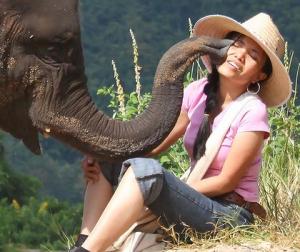It takes a special kind of person to devote her life not to an individual, not to a group of individuals, but to a species. Sangduen Chailert—known as "Lek"—is definitely a special person.
Lek is the co-founder and the on-site director of the Elephant Nature Park, in northern Thailand, a rescue and rehabilitation center for elephants. Since 1996, the park has rescued dozens of elephants, and provided a natural environment in which to care for them.
Lek's day typically begins at 6:30 in the morning and continues to almost midnight. She routinely heals, feeds, and otherwise tends to 35 elephants or more, some as young as 1 and some as old as 80. She also gives weekly talks to humans, mostly in Thai but some in English, on protecting these endangered creatures.
There's one thing Lek does that somewhat endangers her: She campaigns against "crushing," the stabbing, beating, and starving that handlers do in order to "tame" an elephant. This has earned her the enmity of certain officials in the Thai government; Thailand's economy counts on tourism, and when foreigners are informed about how endangered animals are being mistreated, Thailand loses some of its "romantic" image.
The Park, and Lek herself, have been subject to harassment, raids, and threats over the past several years. For example, in 2012, employees of the Park were interrogated for over 13 hours by dozens of armed officials investigating an "anonymous" complaint that 70 wild elephants were being abused there; the complaint was baseless, and probably fabricated. Despite such incidents, Lek continues to speak out about how animals—particularly elephants—are treated throughout southeast Asia. As she said at the time of the raid, "We will do whatever possible to protect our elephants. Today I prepare to go to jail, but the fight for my animals and justice will never stop."
Lek grew up poor in a rural mountain village of northern Thailand, but she worked hard and earned a B.A. from Chiang Mai University, something rare for a woman in her circumstances. When she was a girl, her family had cared for an elephant, and Lek's relationship with that elephant led to her vision of caring for all elephants. When she saw the poor conditions that elephants were living under, that vision became a mission.
Elephants are dwindling in number. In the 1980s, Thailand had over 100,000; in 2013, the number is closer to 5,000. Many of those are in captivity, neglected, or—often worse—used in entertainment venues, where they are regularly brutalized. Lek herself says, "They are facing a tough time, and, if we don't do something now, the elephants won't be with us for much longer."
Here's a glimpse of what it's like to take care of a sick elephant, in Lek's own words:
"A whole month I have to stay with the baby elephant in his pen. The more time I spend with him, I feel that I can help him survive. Most people who first see him doubt that he survive, but I have promised myself I will coax him to health. I firmly believe that my love will heal him .
"The month went past so quickly, he is healing and getting better, his wounds are closing. His skins has peeled many times from sunburn. He can have a bath and I put coconut oil on him after bath. He has put on weight, but I have lost 5 kilo of my own. Finally my body couldn't cope and I fall into a deep sleep one night. I am so tired and fall asleep. I was awakened by a gentle massage from little feet. I open my eyes and see what he is doing. What will he do next if I don't wake up? The baby tried hard to push me to stand up. He use his trunk to touch my nose, checking I am still alive. Impatience gets the better of him and he starts to trumpet and kicking me to wake up. I stand up and hug him. He shrinks his trunk and shake the head, seeming so happy. Suddenly he opens his mouth and gives me big sloppy kisses."
Lek sums up her work this way: "It takes a stone heart for those lucky enough to work with elephants not to love them."

